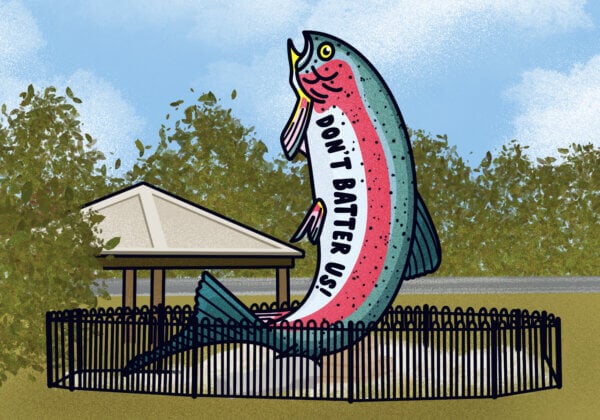There’s No Arguing With Science: Fish Experience Pain
You don’t need a degree in ichthyology to recognise that fish feel pain.
Skewered through their sensitive mouths with hooks or torn away from their homes in nets, fish contort in terror and pain until their gills collapse and they suffocate. Their swim bladders can even rupture because of the sudden change in pressure.
In an article featuring fish experts from around the globe, Outside magazine recently highlighted the growing body of proof that fish not only feel pain but also use tools, cooperate with each other, and show their smarts in other ways.
According to Culum Brown, a behavioural ecologist who studies fish at Macquarie University in Sydney,
“The broad consensus from the scientific community is that fish most likely feel pain”.
He adds, “The evidence, scientifically, is so overwhelmingly in favour – there might be some doubt, but not much more than on whether humans feel pain”.
Like those of other vertebrates, a fish’s nervous system produces neurotransmitters such as endorphins to alleviate suffering. A study in Applied Animal Behaviour Science found that after being exposed to painful heat, fish exhibited signs of fear and wariness, illustrating that they experience and remember pain. And scientists at Queen’s University Belfast proved that fish, just like other animals, learn to avoid pain.
Those are just a few reasons to leave fish off our plates.
Here’s another: in many areas, including memory, the cognitive powers of fish “match or exceed those of ‘higher’ vertebrates including non-human primates”, Brown explains.
Fish also use an array of low-frequency sounds to court potential mates and to communicate everything from delight to alarm, and researchers at the University of Leeds found that while some fish live in small family units and others in large hierarchical societies, these social aggregations function as a sort of communication centre for them.
Biologists wrote in Fish and Fisheries that fish are “steeped in social intelligence, pursuing Machiavellian strategies of manipulation, punishment and reconciliation”.
The fishing industry captures between 1.7 and 3 trillion of these intelligent, sensitive animals each year.
Need more reasons to leave fish in peace?
Fish flesh, like that of other animals, contains excessive amounts of protein, fat, and cholesterol. It can also accumulate unsafe levels of carcinogenic residue such as PCBs as well as mercury, which has been tied to cardiovascular disease, foetal brain damage, blindness, and difficulties with motor skills and attention span.
If that isn’t enough to put you off greasies, fish flesh often carries parasites. Case in point: a panicked food writer in the United States texted a friend that the leftovers from the sea bass (barramundi) she had just eaten were “CRAWLING WITH WORMS ALIVE WORMS”.
There’s no need to eat fish – it’s bad for our health and worse for fish – and since supermarkets stock a variety of tasty, healthy vegan fish options, you won’t miss it.
Ready to ditch fish? You can get a free vegetarian/vegan starter kit here.
Gardein ‘Fishless Filet’ – available at many IGA stores







